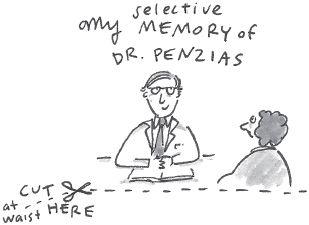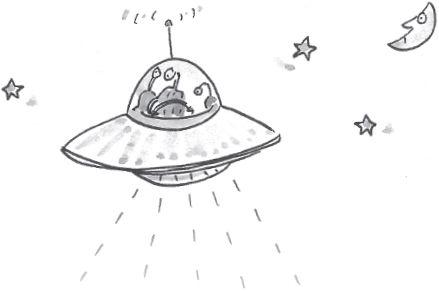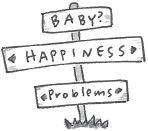One Good Egg: An Illustrated Memoir (25 page)
Read One Good Egg: An Illustrated Memoir Online
Authors: Suzy Becker

The morning before the first ultrasound, a bowl of leftover dog dinner fell off the top of the refrigerator onto Lorene’s head. We tried not to take it as a bad omen, but sure enough, the ultrasound was not routine. “Do you have both ovaries?” the tech asked. “Have you had endometriosis?” She shook her head. “Something’s going on here.”
Techs can never say
what
is going on, but that never stops me from asking. “Something’s going on with your left tube,” she answered. “Could be a hemorrhage. Could be a cyst. Could be . . . anything, really. I wish I could tell you more.” It was enough. Tears ran down the sides of my face and pooled at my hairline as I lay there. Now my good tube was ruined. I’d won the Clomid battle, but I was losing the war.
When we got home, our updated injection instructions were on the machine: stick with the same dosage of Gonal-f, no mention of my tube. When I called back, I was told they were running tests on the blood, but Dr. Penzias wasn’t concerned. We were probably looking at some leftover ectopic-pregnancy tissue.
The blood tests didn’t allay Dr. Penzias’s nonconcern. He ordered another ultrasound and this time he, personally, wanted to do a pelvic exam. The second ultrasound tech identified a “complex cyst” on my left ovary; nothing wrong with my left tube, and she had no problem finding both ovaries. There was a long wait between the ultrasound and Dr. Penzias’s pelvic exam, but once I was dressed, he immediately took us into his office.

“Well, I don’t think it’s cancer, that’s the good news!”
Cancer?!
He spread out the films. “It’s a complex cyst; complex in the sense we’re seeing solid and fluid. It’s reduced over the two days, you can see the fluid is drying up. I’m thinking it could just be an irregular ovulation. I didn’t feel anything; you’re not exhibiting any other symptoms . . . As long as your levels continue to rise appropriately, I see no reason why we need to scrap this cycle.”
“Are we
sure
it’s not cancer?” Lorene asked.

“If it’s an irregular ovulation, the body will reabsorb everything. We’ll keep an eye on it.”
I was in my studio when the update nurse called that afternoon. “How’d the meeting go?”
“Okay. Everything’s okay as long as the levels are rising—”
“Unfortunately, they’re not. Your estradiol is at eighty; it should have been one-twenty.”
That was it. End of cycle. Just like that.
Dr. Penzias had a new plan. We would skip trying in December— enjoy the holidays, give the cyst a chance to dry up, and on Day 21 of my next cycle, we would begin a round of Lupron injections, effectively shutting down my ovaries and ceding complete control of my cycle to medicine.
Lorene and I babysat for Henry that night. We went to see the Hugh Grant movie
Love Actually
afterward. No 9:30 shot to race home for. “You were crying,” Lorene said as we were leaving the parking lot.
“I know. It was the Christmas pageant. The thought of never having a kid in the Christmas pageant.”
She was laughing. “I’m sorry, but did you think you’d have a kid in a church—”
“I’ll tell you what I was
also
thinking: For once I wasn’t crying about the romance, the thought of never having the big love . . . ” I started to cry again. “I feel like I’ve been this really good sport, having the shots, the tests, smiling instead of wincing . . . What if I turned into the barren-sister-bitch-maniac and kidnapped Henry or sued Meredith for unfit motherhood?”
Lorene rested her head on my arm. “I wish I wasn’t so old, I would have the baby for you.”
I wish
I
wasn’t so old.
“It scared me when he said cancer,” I said. “It’s the first time I really thought about all this stuff I’m putting into my body.”
“
I’m
putting into your body. Every time I give you a shot, I think about it.”
“One more try.”
“Your insurance would pay for at least two more . . . ”
“One. If I can, if the cyst goes away, I’ll give it one more try.”

The next night we were in the car again on the way home from dinner at our friends’. We turned the radio on; scary futuristic music was playing—it was the BBC’s
Instant Guide to IVF
. A male narrator was describing the lengths to which some women go to have babies, test-tube babies. More scary music. I looked at Lorene just to make sure I wasn’t the only one hearing it, and she flipped it off.
I woke up with an awful headache the next morning. This headache hung on for three days. By the second, I’d forgotten I had a headache and settled into a bad mood, which I attributed to the last and final round of book proofing. And to the town library’s
not
getting the roof grant, which I had previously sworn would come as a relief but in reality made me angry about all the pointless work I’d done. And to
Seed
changing the publication date on its next issue, rendering my holiday cartoon useless. And to the Massachusetts State Supreme Court’s decision to give same-sex couples the right to marry, which, I know, was cause for celebration, but also took the lid off the very vocal opposition and exposed a lot of the so-called support as disappointingly lukewarm.

con • done
verb
: To forgive an offense
Lorene attributed it to going off hormones cold turkey.
I
t was December. It was the end of the year in which we had tried to have a baby. While neither of us would admit it out loud, we had stopped believing there would be a baby. I’d like to think we never stopped believing we would be happy without one.

Left to herself, Lorene would have taken time to process the disappointment and grieve the loss of the child we would never have. But she was with me. That kind of time could be my undoing. Instead, she set plans in motion for the construction of our dream studio. Our other life. She brought the carpenter-handyman from a local historic inn over to our barn and the three of us did a walk-through, imagining a porch here, a rope swing and a couple of salvaged doors there.

We would live in Bolton another ten to fifteen years. Then, when I was in my fifties and Lorene in her sixties, we’d sell the house and the cars and join the Peace Corps, as a couple, and spend two years working in some far-flung spot. After that, we’d take a small subset of our stuff out of storage and move to the city, where we would go to more movies and lectures and make young friends. I still had some convincing to do.

With all the money we never spent on college, we’d travel. Our new friends would look after us in our dotage, the way we looked after our old friends in Bolton. There’s no guarantee our child would have looked after us anyway.

